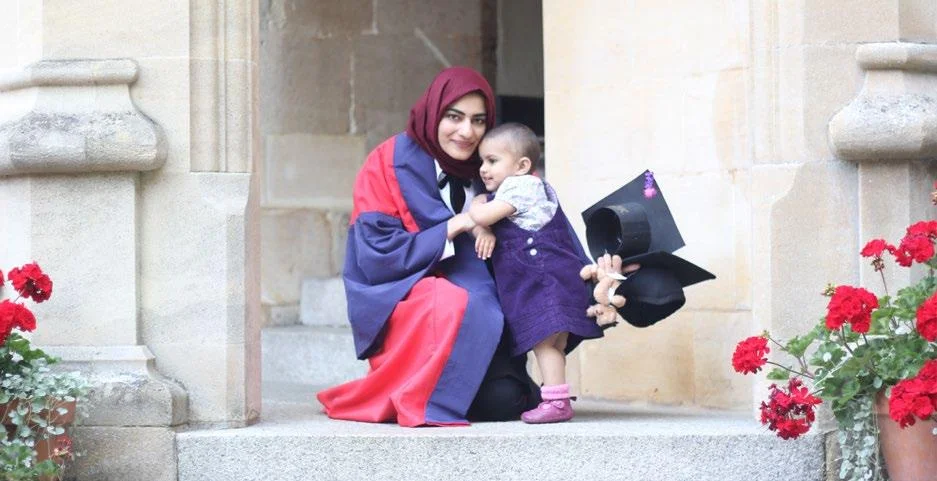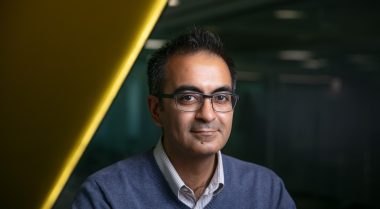Sara Khalid: Improving diversity and female leadership in human health and climate change research
8 March 2024 | Author: Sara Khalid, Associate Professor and Senior Research Fellow in Biomedical Data Science and Health Informatics
Professor Sara Khalid provides an overview of her work combining human health and climate change and shares her most rewarding, yet bittersweet, elements of her career; being one of the very few brown women engineers in academic leadership.
 Professor Sara Khalid is an Associate Professor of Health Informatics and Biomedical Data Science at the Centre for Statistics in Medicine (CSM) at the University of Oxford. She leads the Planetary Health Informatics (PHI) lab, which focuses on combining real-world health and environmental data to look at how our health and climate change are interconnected.
Professor Sara Khalid is an Associate Professor of Health Informatics and Biomedical Data Science at the Centre for Statistics in Medicine (CSM) at the University of Oxford. She leads the Planetary Health Informatics (PHI) lab, which focuses on combining real-world health and environmental data to look at how our health and climate change are interconnected.
Sara leads the Ethnicity, Equity and AI study which is part of HDR UK’s Data and Connectivity COVID-19 Core Studies. She was part of our ‘The grand challenges in health data’ panel at this year’s HDR UK Conference, and won the Best Lightning Talk award at our previous HDR UK Conference in 2022 for her 4-minute presentation on ‘Ethnicity, Equity and AI’.
Tells us about your work – what makes it interesting for you?
I am the principle investigator for the PHI lab at the University of Oxford, where we undertake research which combines human health and climate change. We combine real-world evidence from these environments with both medical statistics and artificial intelligence to apply them for good. Essentially, I hope that every project and piece of research from our lab creates positive impacts that make a real difference to peoples’ lives, pushing to use AI for good rather than the negative light it can be painted in. This has included everything from improving prediction methods for Malaria using satellite and environment data from South Asia, to producing a medical large language model that is able to analyse and summaries patient records in resource-limited settings to accurately help doctors to make urgent front-line medical decisions.
A lot of our health-related projects also have a strong element of health equity, meaning we’re using our research to ensure healthcare serves all, whether that’s people with different ethnic backgrounds, patients with rare conditions and men and women of every age. For me, the biggest inspiration is the future generation, and seeing them care so passionately, so earnestly and so unconditionally about issues like climate change and social justice is my driving force. It’s the impact of our work on the future generations using this new and exciting methods and data sources which makes our work so interesting for me!
What drew you to this work? Was it always your aim to work in health data science?
My sense of living in harmony with our natural world was seeded early on. During one of my very first primary school trips to the seaside in Karachi in Pakistan, alongside friends and teachers, we were doing some beach cleaning, and it was the first time I recognised the intrinsic, inseparable link we as humans have with the environment, which then comes back full circle to impact our own health. Our duty to salvage and sustain this beautiful symbiosis is the core of planetary health, and is a fundamental part of my personal value system, my research, and my experience as a parent.
That being said, my journey into researching this topic was anything but straightforward or intentional. When applying to university I chose to study electrical engineering. However, I knew I didn’t want to apply this education to build radars or weapons that cause more harm than good. Instead, I pursued biomedical engineering in Oxford as a Rhodes Scholar, applying my knowledge to save lives by helping to create early detection methods of heart attacks.
As a successful woman in a generally male-dominated field, have you experienced any challenges due to your gender? How did you overcome this, if so?
To me, health data science is no different to so many STEM fields, with all the well-known barriers and glass ceilings in place. These only get higher the more senior your role becomes in these fields, so it is no surprise that less than 30% of women actually make it to the top. It can be a constant challenge, but looking back at my journey , I am incredibly proud of the challenges I’ve overcome and just how far I have come – it’s all been worth it!
I’m also incredibly grateful that through my positions, including as a PI in the PHI lab and within St Catherine’s college at Oxford, I’m able to reach back a hand to support others in fulfilling their potential – whether that’s through groups like Women in Data Science Oxford that I’ve set up, through ensuring that we have diverse and exceptional lab staff and students, or supporting students who are applying to Oxford for their post-graduate degree just as I was when I was given the chance which set me onto this journey.
What is the most rewarding experience you’ve had in your career so far? What are you most proud of?
While there’s many parts of my career that have been incredibly rewarding, I think perhaps the most poignant, if bittersweet, part of my career is the fact that I’m one of the very few brown women engineers who have made it into a senior academic role. While it is incredibly rewarding to be able to see how far I’ve come, and heartening to begin to see others women in leadership roles, I know from experience that there could be so many more women making a significant and meaningful impact given the right sort of support and opportunities.
What would your take-home-tip that you’d like to share for the next generation of women, who may be considering a career in health data science or a STEM subject?
My advice would be exactly as I was told by my dad when I graduated as an engineer: “the world is your oyster!”
When you’re not working, what do you enjoy doing?
As a mum of a secondary schooler, a primary schooler and a brand new baby to boot, there’s never a dull moment! It’s funny to see how they view my research though – when I told them I was a professor, they told me that couldn’t be true because professors are men with long grey beards!



